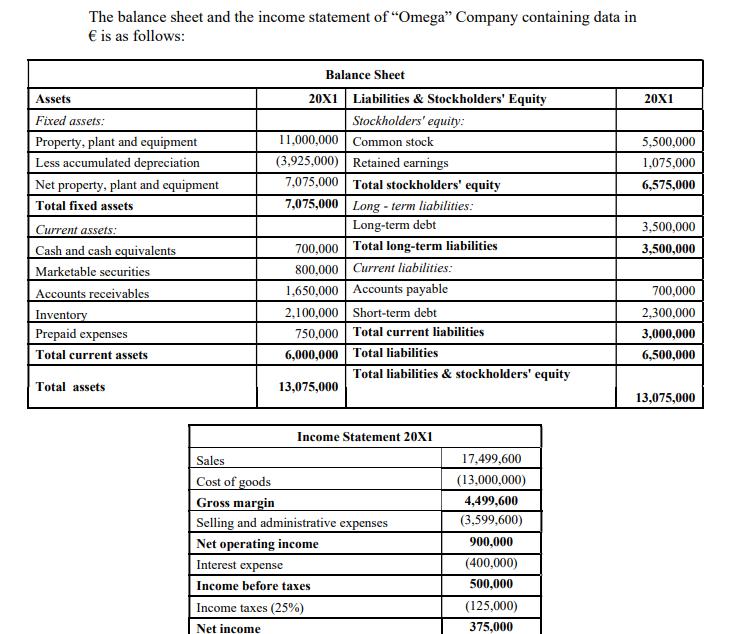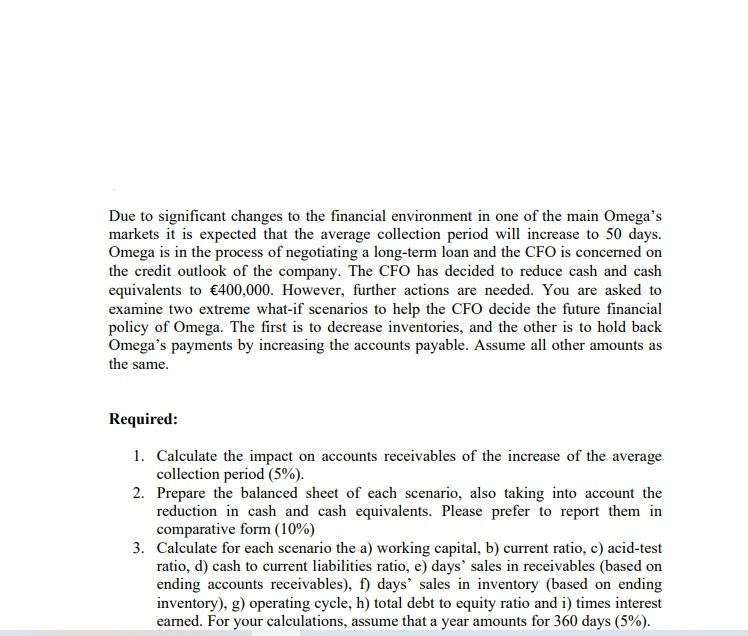The balance sheet and the income statement of Omega Company containing data in is as follows: Assets Fixed assets: Property, plant and equipment Less


The balance sheet and the income statement of "Omega" Company containing data in is as follows: Assets Fixed assets: Property, plant and equipment Less accumulated depreciation Net property, plant and equipment Total fixed assets Current assets: Cash and cash equivalents Marketable securities Accounts receivables Inventory Prepaid expenses Total current assets Total assets Balance Sheet 20X1 Liabilities & Stockholders' Equity. Stockholders' equity: 11,000,000 Common stock (3,925,000) Retained earnings 7,075,000 7,075,000 Total stockholders' equity Long-term liabilities: Long-term debt 700,000 Total long-term liabilities 800,000 Current liabilities: 1,650,000 Accounts payable 2,100,000 Short-term debt 750,000 6,000,000 13,075,000 Interest expense Income before taxes Income taxes (25%) Net income Total current liabilities Total liabilities Total liabilities & stockholders' equity Income Statement 20X1 Sales Cost of goods Gross margin Selling and administrative expenses Net operating income 17,499,600 (13,000,000) 4,499,600 (3,599,600) 900,000 (400,000) 500,000 (125,000) 375,000 20X1 5,500,000 1,075,000 6,575,000 3,500,000 3,500,000 700,000 2,300,000 3,000,000 6,500,000 13,075,000 Due to significant changes to the financial environment in one of the main Omega's markets it is expected that the average collection period will increase to 50 days. Omega is in the process of negotiating a long-term loan and the CFO is concerned on the credit outlook of the company. The CFO has decided to reduce cash and cash equivalents to 400,000. However, further actions are needed. You are asked to examine two extreme what-if scenarios to help the CFO decide the future financial policy of Omega. The first is to decrease inventories, and the other is to hold back Omega's payments by increasing the accounts payable. Assume all other amounts as the same. Required: 1. Calculate the impact on accounts receivables of the increase of the average collection period (5%). 2. Prepare the balanced sheet of each scenario, also taking into account the reduction in cash and cash equivalents. Please prefer to report them in comparative form (10%) 3. Calculate for each scenario the a) working capital, b) current ratio, c) acid-test ratio, d) cash to current liabilities ratio, e) days' sales in receivables (based on ending accounts receivables), f) days' sales in inventory (based on ending inventory), g) operating cycle, h) total debt to equity ratio and i) times interest earned. For your calculations, assume that a year amounts for 360 days (5%).
Step by Step Solution
3.45 Rating (152 Votes )
There are 3 Steps involved in it
Step: 1
a Working Capital Rationet sales Current AssetsCurrent Liabilities 17499600500000 349992 b Current R...
See step-by-step solutions with expert insights and AI powered tools for academic success
Step: 2

Step: 3

Ace Your Homework with AI
Get the answers you need in no time with our AI-driven, step-by-step assistance
Get Started


